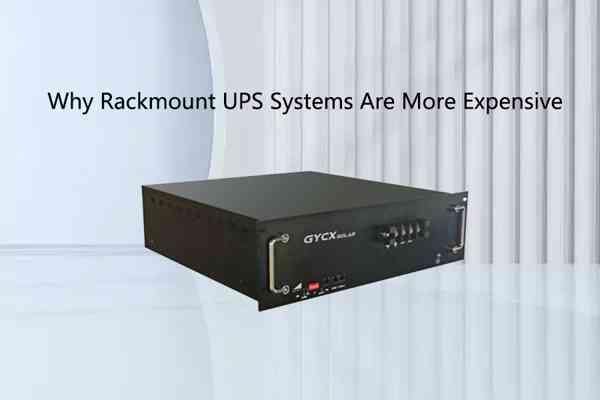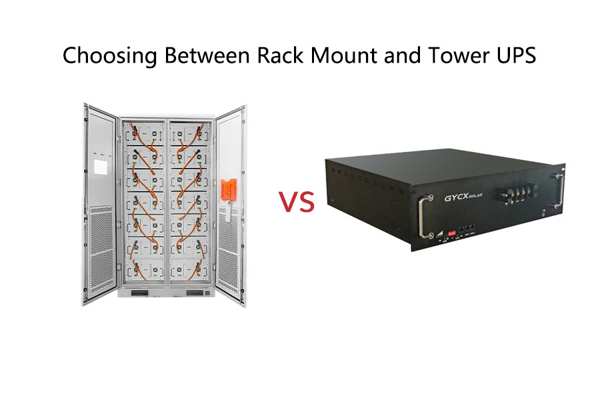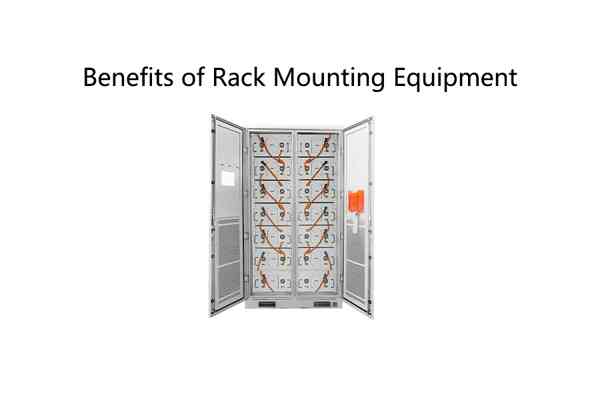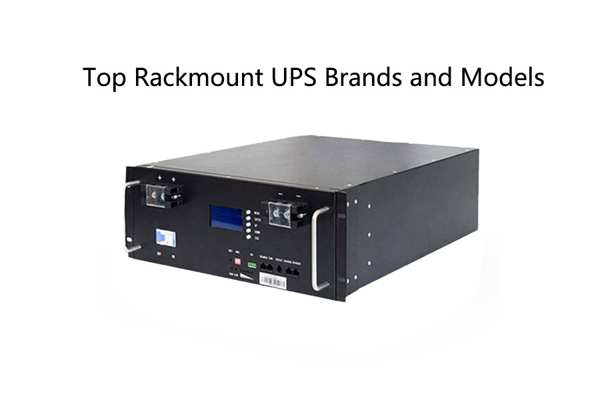Czy zapasowe baterii są tego warte?
W świecie, który działa na stałej mocy, Wszelkie przerwy może być czymś więcej niż tylko niedogodnością - może oznaczać utratę pracy, uszkodzone dane, a nawet uszkodzony sprzęt. Prowadzi to do kluczowego pytania dla każdego domu lub firmy z krytyczną elektroniką: To kopia zapasowa baterii naprawdę warta inwestycji? Zbadajmy dostarczaną wartość.
Tak, Kopia zapasowa baterii są absolutnie tego warte. Standardowe UPS (Zasilacz nieprzerwany) Działa jako niedrogie ubezpieczenie, Ochrona wrażliwej elektroniki o wartości tysięcy dolarów przed utratą danych i uszkodzeniem sprzętu. Dla większych, bardziej krytyczne aplikacje, Kopia zapasowa baterii do montażu stojaka zapewnia niezbędny czas pracy dla firm, ochrona ciągłości operacyjnej i zapobieganie kosztownym przestojom. Koszt zapobiegania jest prawie zawsze znacznie niższy niż koszt odzyskiwania.

Na Gycx Solar, Jesteśmy w branży odporności na energię. Podczas gdy często rozmawiamy o zasilaniu całych domów w systemach słonecznych i dużych akumulatorów, Zasada ochrony poszczególnych urządzeń krytycznych jest równie ważna. Zagłębijmy się w szczegóły tworzenia kopii zapasowych baterii, szczególnie solidne systemy montażu stojaków używane w środowiskach profesjonalnych.
Dlaczego Rackmount Ups są tak drogie?
Kiedy zaczniesz patrzeć na roztwory tworzenia kopii zapasowych baterii, Prawdopodobnie zauważysz, że eleganckie stojaki montażowe zaprojektowane dla szaf serwerowych mają wyższą cenę niż ich samodzielne odpowiedniki wieży o podobnych ocenach zasilania. Co uzasadnia ten koszt premium?
Systemy montażu stojaków są droższe, ponieważ są wyspecjalizowanymi elementami sprzętu zaprojektowanego w celu uzyskania wysokiej gęstości, Środki krytyczne. Wyższy koszt wynika z ich Kompaktowa i wydajna termicznie konstrukcja, użycie wyższej klasy, Bardziej niezawodne komponenty, pakiet Zaawansowane funkcje zarządzania skierowany do profesjonalistów IT, i a Solidna konstrukcja mechaniczna Obejmuje to niezbędny sprzęt montażowy.

Nurkuj głębiej: Inżynieria za ceną
Rozbijmy wartość, którą otrzymujesz za wyższe koszty:
- Specjalistyczna inżynieria: Bezpieczne pakowanie potężnych falowników jest znaczącym wyzwaniem, ładowarki, i baterie w szczupłym poziomym podwoziu 1U lub 2U, jednocześnie skutecznie zarządzając ciepłem. Wymaga to bardziej wyrafinowanej inżynierii i często mniejszej, bardziej kosztowne elementy wewnętrzne w porównaniu z bardziej przestronną jednostką wieżową.
- Komponenty wyższej jakości: Środowisko wewnątrz pakowanego stojaka serwerowego może być znacznie gorętsze i bardziej wymagające niż typowa przestrzeń biurowa. Jednostki montażowe w stojakach są zbudowane z komponentów (kondensatory, fani, płytki obwodowe) które mają wyższe tolerancje temperatury i większą niezawodność, aby upewnić się, że nie zawiodą podczas ochrony serwerów krytycznych biznesowych.
- Zaawansowane funkcje jako standardowe: Jednostki montażowe w stojakach to profesjonalne narzędzia, I mają one profesjonalne funkcje. Często obejmują one:
- Karty zarządzania siecią: Umożliwianie zdalnego monitorowania i kontroli UPS w sieci.
- Baterie z gorącymi spinkami: Możliwość wymiany wkładów akumulatorów bez zasilania podłączonego sprzętu jest kluczową funkcją do utrzymania 100% czas aktu.
- Wyrafinowane wyświetlacze LCD: Dostarczanie szczegółowych informacji o obciążeniu w czasie rzeczywistym, Zdrowie baterii, i status systemu.
- Zmienione grupy wylotowe: Umożliwiając zdalne uruchomienie określonych urządzeń lub zrzucenie obciążeń niekrytycznych, aby przedłużyć czas wykonywania najważniejszego sprzętu.
- Solidna konstrukcja mechaniczna: Podwozie musi być zbudowane tak, aby były bezpiecznie obsługiwane przez szyny bez zginania lub opatrzania pod jego znaczną wagą. Koszt obejmuje również precyzyjnie zaprojektowane zestawy kolejowe potrzebne do bezpiecznej instalacji.
Gycx Solar Story: „Widzimy podobną zasadę w naszych rozwiązaniach słonecznych. Wysoko wydajny panel słoneczny lub długotrwałe baterię LFP kosztuje więcej niż niż niż niż niż niż niższa alternatywa, Ale inwestycja opłaca się w zakresie niezawodności i wyników. To samo dotyczy profesjonalnych montażu stojaków APC; Inwestujesz w niezawodność swoich krytycznych systemów."
Czy potrzebuję montażu stojaka? (UPS)
Jesteś przekonany, że potrzebujesz kopii zapasowej baterii, Ale wybór między standardową jednostką wieżową a modelem montażu stojaka może być mylący. Skąd wiesz, czy Twoja sytuacja naprawdę wymaga rozwiązania zintegrowanego w stojaku, lub jeśli wystarczy prostsza jednostka wieży?
Potrzebujesz Montaż do stojaka Jeśli twój krytyczny sprzęt - taki jak serwery, Przełączniki sieciowe, routery, tablice przechowywania, lub profesjonalny sprzęt AV - jest już zorganizowany i umieszczony w ramach standardowy 19-calowy stojak lub szafka. Ups stojaki są specjalnie zaprojektowane do bezproblemowej integracji z tym środowiskiem, Zapewnienie czystości, bezpieczny, i wysoce ekonomiczne rozwiązanie ochrony zasilania. Jeśli Twój sprzęt siedzi na biurku lub podłodze, Wieża jest bardziej praktycznym wyborem.

Nurkuj głębiej: Dopasowywanie formularza do infrastruktury
Decyzja sprowadza się do istniejącej konfiguracji i przyszłych planów.
- Wybierz stojak na uprawnienia, kiedy:
- Masz 2-postowy lub 4-postowy stojak na sprzęt.
- Musisz chronić wiele kawałków sprzętu zębatego.
- Przestrzeń podłogowa lub półki jest ograniczona, i chcesz skorzystać z pionowej przestrzeni stojakowej.
- Pragniesz scentralizowanego, czysty, i zorganizowana konfiguracja dla wszystkich krytycznych komponentów, w tym moc.
- Potrzebujesz zaawansowanych funkcji zarządzania zdalnego, które są powszechne w modelach montażu stojaka.
- Wspólne środowiska obejmują pokoje serwerów biznesowych, To szafy, centra danych, Home Labs, i profesjonalista instalacji.
- Wybierz wieżę, kiedy:
- Ochrona samodzielnego komputera stacjonarnego, stacja robocza, lub system sprzedaży.
- Twoje biuro lub konfiguracja domu nie korzysta z scentralizowanego stojaka na sprzęt.
- Potrzebujesz prostego, Przenośne rozwiązanie ochrony zasilania, które można łatwo przenieść.
Kluczem jest dopasowanie współczynnika formularza UPS do współczynnika formowania chronionego sprzętu. W Gycx Solar, Stosujemy tę samą logikę. Dla dużego, Modułowy system magazynowania energii, Używamy naszych Kopia zapasowa baterii do montażu produkty zainstalowane w szafce. Dla jednego elementu sprzętu monitorującego przy biurku, Mała wieża byłaby bardziej odpowiednia. Chodzi o użycie odpowiedniego narzędzia do pracy.
Jakie są zalety montażu stojaka?
Dlaczego profesjonaliści praktycznie w każdej dziedzinie technicznej, od niego do zarządzania nadawaniem i energią, w przeważającej mierze wolą zamontować swój krytyczny sprzęt? Jakie są namacalne zalety tego znormalizowanego systemu?
Główne korzyści z montażu stojaka to Najwyższa wydajność przestrzeni, A Wysoce zorganizowana i scentralizowana konfiguracja, Ulepszony i przewidywalny przepływ powietrza do chłodzenia sprzętu, Zwiększone bezpieczeństwo fizyczne, i a Standaryzowana platforma To upraszcza konserwację, kierownictwo, i skalowalność. To ustrukturyzowane podejście przynosi porządek i niezawodność złożonych systemów elektronicznych.

Nurkuj głębiej: Moc znormalizowanego systemu
Zbadajmy wartość, jaką zapewniają te korzyści:
- Wydajność przestrzeni: Stojaki pozwalają na układanie sprzętu w pionie, konsolidowanie dużej ilości sprzętu w minimalnym śladzie podłogowym. W drogiej przestrzeni centrów danych lub w małej szafie IT, To jest niezwykle cenne.
- Organizacja & Centralizacja: Stojak staje się centralnym centrum dla twoich krytycznych systemów. To zachęca do schludnego zarządzania kablem, logiczne grupowanie urządzeń, oraz profesjonalna instalacja, która jest o wiele łatwiejsza do rozwiązywania i utrzymania niż rozproszony sprzęt.
- Przepływ powietrza & Chłodzenie: Stojaki i wyposażenie dla nich są zbudowane jako system do zarządzania ciepłem, Zazwyczaj z ścieżką przepływu powietrza od przodu. Zapobiega to hotspotom i zapewnia, że wrażliwa elektronika działa w ich optymalnym zakresie temperatur, co jest kluczowe dla długowieczności, Zwłaszcza w ciepłym klimacie, takim jak Singapur.
- Bezpieczeństwo fizyczne: Większość stojaków serwerowych to zamknięte szafki z zamkniętymi drzwiami. Zapewnia to istotną warstwę bezpieczeństwa, Ochrona cennego sprzętu, takich jak serwery i jednostki UPS przed nieautoryzowanym dostępem lub przypadkowymi uszkodzeniem.
- Normalizacja (EIA-310): Globalny 19-calowy standard stojakowy oznacza, że możesz mieć pewność, że certyfikowany sprzęt od różnych dostawców (Jak APC UPS, przełącznik sieciowy z innej marki, oraz serwery różnych twórców) fizycznie pasuje do siebie. To upraszcza planowanie i zakup.
- Skalowalność: Stojak zapewnia wyraźną ścieżkę wzrostu. W miarę rozwoju twoich potrzeb, Możesz łatwo dodać więcej komponentów do dostępnej przestrzeni U w ramach pojemności stojaka.
- Usłunność: Funkcje takie jak przesuwane szyny pozwalają technikom łatwy dostęp do przodu lub tyłu urządzenia do obsługi bez konieczności całkowitego montażu, Oszczędzanie znacznego czasu i wysiłku.
Co to jest najlepsze stojaki 2025?
Jesteś przekonany, że potrzebujesz stojaków, A teraz chcesz kupić absolutnie najlepszy dostępny. Z tak wieloma modelami renomowanych marek, Jak wybrać zwycięzcę 2025?
Nie ma singla „Najlepsze" stojaki dla wszystkich; the Najlepszy wybór zależy całkowicie od twoich konkretnych potrzeb i budżetu. „Najlepsze" ponieważ mały serwer biurowy będzie inny od „najlepszych" dla centrum danych. Jednakże, Możemy kategoryzować najlepsze wybory:
- Najlepsza wartość wszechstronna (Interaktywne liniowe): Dla większości serwerów biznesowych i sprzętu sieciowego, modele z APC Smart-ups (Seria SMT) Lub Cyberpower PFC SineWave Linie oferują doskonałą równowagę ochrony czystej fali sinusoidalnej, niezawodność, i koszt.
- Maksymalna ochrona (Podwójna konwersja online): Dla krytycznych, Wrażliwy sprzęt, który nie może tolerować żadnych przerwy w mocy, Modele online, takie jak The Seria Eaton 9px, Vertiv Liebert GXT5, Lub APC Smart-ups online (Seria SRT) to wybory na najwyższym poziomie.
- Najlepsze na długi czas pracy: Tu nie chodzi o model UPS, ale o sparowaniu zdolnych UPS Zewnętrzne moduły baterii (EBMS). Dla naprawdę dłuższych czasów runach mierzonych w godzinach, Rozmowa przesuwa się z tradycyjnego UPS na oddany System magazynowania energii akumulatorowej (BESS), Podobnie jak skalowalne roztwory tworzenia kopii zapasowych baterii w stojaku, które oferujemy w Gycx Solar.

Nurkuj głębiej: Jak wybrać „Najlepsze" UPS dla ciebie
Oto jak określić swoją najlepszą opcję:
- Oceń swój obciążenie: Oblicz całkowite zużycie energii (w Watts) spośród wszystkich urządzeń, które planujesz połączyć się z UPS. Dodaj 20-25% do przyszłego wzrostu. Ocena WATT UPS musi przekroczyć tę liczbę.
- Wybierz swoją topologię:
- Interaktywne liniowe z czystą falą sinusoidalną: To jest słodkie miejsce dla większości nowoczesnych serwerów i sprzętu sieciowego. Chroni przed powszechnymi problemami z energią i jest bardziej wydajny i przystępny niż model online.
- Podwójna konwersja online: Wybierz to, jeśli masz wyjątkowo wrażliwy sprzęt medyczny lub naukowy, lub jeśli Twoja lokalizacja cierpi na bardzo słabą jakość zasilania. Zapewnia idealne, Regenerowana moc z zerowym czasem transferu, ale przy wyższych kosztach i niższej wydajności energetycznej.
- Określ wymagany czas wykonania: Jak długo potrzebujesz mocy, aby pozostać w trakcie awarii? Do bezpiecznego zamknięcia, 5-10 Wystarczy minuty. Jeśli chcesz przetrwać dłuższe awarie, Potrzebujesz modelu UPS, który obsługuje EBMS, Lub powinieneś patrzeć na znacznie większą bess.
- Wybierz renomowaną markę: Marki lubią APC autorstwa Schneider Electric, Eaton, Czasownik, Cyberpowład, i Tripp Lite by Eaton mają długotrwałą reputację jakości, niezawodność, i wsparcie.
- Sprawdź kluczowe funkcje: Poszukaj funkcji, które mają dla Ciebie znaczenie, Jak akumulatory gorące, karta zarządzania siecią do zdalnego monitorowania, i wyraźny wyświetlacz LCD.
Gycx Solar Story: „Klient przyszedł do nas z prośbą o UPS, który mógłby prowadzić całe biuro 8 godziny. Wyjaśniliśmy, że chociaż ogromne UPS z wieloma pakietami akumulatorami mogą technicznie to zrobić, Bardziej wydajne i specjalnie zbudowane rozwiązanie było jednym z naszych pary słonecznych BESS1. jednostki. Zapewnił potrzebny długi czas wykonawczy i generował własną czystą energię. Chodzi o wybór odpowiedniej skali ochrony."
Więc, Czy baterie są tego warte? Bez wątpienia, Tak. Są to niewielka cena za ochronę cennego sprzętu i zapewnienia ciągłości operacyjnej. Dla osób z rackowanym sprzętem, Montaż stojaka to rozwiązanie profesjonalne, którego wyższy koszt jest uzasadniony specjalistycznym projektem, niezawodność, i korzyści organizacyjne, jakie przynosi.
W Gycx Solar, Jesteśmy ekspertami od niezawodności władzy, Od ochrony jednego serwera po zapewnienie całego domu lub firmy płynnie działa na zapisaną energię słoneczną. Jeśli masz pytania dotyczące projektowania niezawodnego rozwiązania mocy, Skontaktuj się z nami już dziś.
Zrozumienie koncepcji BESS pomoże Ci lepiej porównać i zrozumieć koncepcje danych związanych z baterią. Pomoże to wybrać produkt, który najlepiej odpowiada Twoim potrzebom od naszej firmy. ↩
